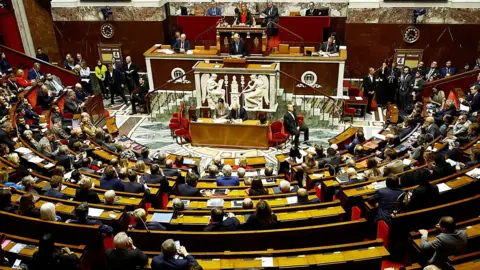Barnier downfall threatens to set a pattern for what lies ahead
 Reuters
ReutersFrance’s political crisis is worse than normal political crises.
Normally when a democratic country passes through turbulence, there is some prospect of the turbulence coming to an end.
Not today in Paris. If anything, the downfall of Michel Barnier – toppled in parliament by a no-confidence motion – threatens to set a pattern for what lies ahead.
For if Barnier – a moderate of the centre-right with a reputation for courtesy and compromise – was unable to pass a budget, then who else can?
The original cause of the crisis has not gone away. It is the division since July of the National Assembly into three roughly equal blocs, none of which is prepared to deal with another.
As a result the two blocs that make up the opposition will always be able to unseat the one bloc that forms a government.
Add to that a mood of near-insurrection on some opposition benches – plus an ideological push for ever more generous spending pledges, despite stark warnings about the national debt – and the idea of a return to serene central politics seems very distant.
For many it is a crise de régime which is being played out, with the very future of the Fifth Republic institutions in jeopardy.
The Fifth Republic was created to concentrate power in the hands of Charles de Gaulle at a time of national crisis. And ever since De Gaulle, presidents have tried – and generally failed – to emulate his stature.
Macron certainly liked to compare himself with le grand Charles.
But when De Gaulle had a similar government crisis in 1962, he went to the people and received a huge popular mandate in the next election.
Macron has done the reverse. He has had his vote – the botched election in July – and lost it. Power has now shifted out of his hands into those of the putative prime minister, answerable to parliament.
 Getty Images
Getty ImagesBut just as the country reverts to being more of a parliamentary system, the Assembly itself has proved incapable of action.
As more than one commentator has pointed out, France – with its monarchical instincts and top-down conception of power – has never developed a culture of compromise.
So the three blocs in the Assembly today – installed by the voters after Macron’s dissolution in June – have proved incapable of creating a constructive environment for government.
As the veteran journalist Eric Brunet said after viewing the debate this evening on BFMTV: “What we have just seen is jaw-droppingly French.
“No pragmatism. Just ideology. All the speeches were about values, about extremes. Our whole discourse is disconnected from reality. It is typically, singularly French.”
Some see it as the culmination of years of France refusing to face economic reality – governments of all colours having given way to calls for ever-growing public spending. The result is a deficit and a debt which can only be addressed by cuts, which no government can ever get passed.
According to Nicolas Beytout, of the pro-business L’Opinion newspaper, this is the start of a series of crises which – counterintuitively – the country actually needs. Because only by being brought face-to-face with the economic abyss, will voters, parties – the country – accept the tough decisions that lie ahead.
Beytout predicts that any new prime minister will face the same problems as Barnier, and like him fail.
“A new government needs time, which it won’t have. It needs a majority, which it won’t have. And it needs the determination to see through the necessary reduction in state spending – which it won’t have.
“So I expect to see several more motions of censure, and several more falls of government – before eventually we start to wake up.”
